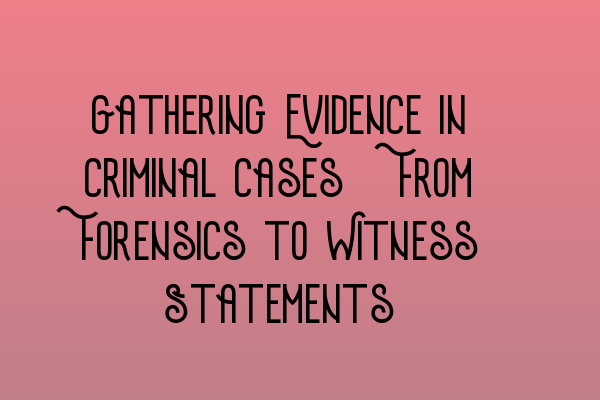Gathering Evidence in Criminal Cases: From Forensics to Witness Statements
Welcome to our blog post on the crucial topic of gathering evidence in criminal cases. When it comes to criminal law and practice, gathering sufficient evidence is paramount in ensuring a fair trial. In this post, we will explore the various types of evidence that can be used, ranging from forensic evidence to witness statements, and discuss their significance in building a robust case.
Forensic Evidence
One of the key pillars of gathering evidence in criminal cases is forensic evidence. Forensic experts play a crucial role in analyzing various types of evidence, such as DNA samples, fingerprints, ballistics, and more. These experts leverage their specialized knowledge and cutting-edge technology to provide objective and scientific evidence that can be presented in court.
When investigating a crime scene, forensic experts meticulously collect evidence, ensuring proper documentation and chain of custody. This evidence can be instrumental in linking suspects to the crime, establishing timelines, and ultimately, determining guilt or innocence.
Witness Statements
Another critical aspect of gathering evidence is gathering witness statements. Witnesses who were present at the scene of the crime or have relevant information can provide invaluable insights into the circumstances surrounding the alleged offense.
Obtaining witness statements involves thorough interviews conducted by skilled legal professionals. These statements can support or challenge the narrative presented by the prosecution or defense. Witness statements can provide first-hand accounts, establish motive, or even help identify additional suspects or leads.
It is crucial to remember that witness statements should be collected ethically and in compliance with legal guidelines to maintain their admissibility in court. As solicitors, it is our responsibility to ensure that witnesses feel comfortable and supported during the process and that their statements are accurately recorded.
The Importance of Expert Testimony
Expert witnesses often play a pivotal role in criminal cases by offering specialized knowledge and opinions on specific subjects. These experts can include forensic scientists, psychologists, medical professionals, or any other field related to the case.
The expert testimony can help clarify complex evidence or provide alternative explanations for the prosecution’s claims. Their expertise can be particularly influential in cases where scientific or technical knowledge is required to understand the evidence.
Preparing and presenting expert testimony requires a deep understanding of the subject matter and the ability to effectively communicate complex concepts to a jury or judge. It is essential to work closely with experts to ensure their opinions are accurately represented and that they can effectively convey their findings to the court.
Conclusion
Gathering evidence in criminal cases is a meticulous process that requires expertise, attention to detail, and knowledge of legal principles. Forensic evidence, witness statements, and expert testimony all contribute to constructing a compelling case.
At SQE Criminal Law & Practice Law UK, we understand the significance of evidence in criminal cases, and we strive to provide exceptional legal services to ensure our clients’ rights are protected. If you are preparing for the SQE exams, be sure to check out our related articles:
- SQE 1 Practice Exam Questions
- SQE 1 Practice Mocks FLK1 FLK2
- SQE 2 Preparation Courses
- SQE 1 Preparation Courses
- SRA SQE Exam Dates
These articles will provide you with further guidance and resources to enhance your preparation for the SQE exams.
Thank you for reading our blog post on gathering evidence in criminal cases. If you have any legal needs or questions about criminal law and practice, please do not hesitate to contact us. Our expert team is here to support you.
